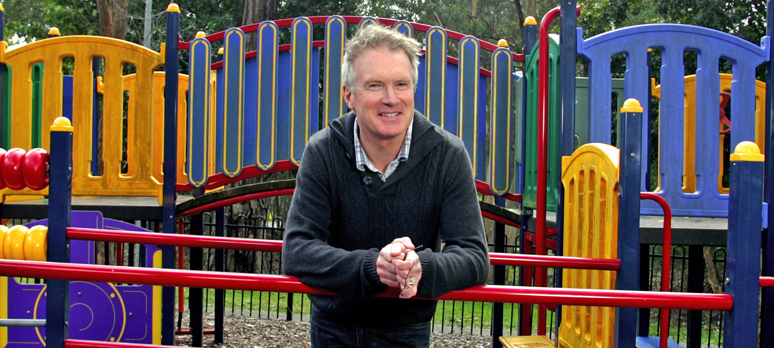Researcher Highlights
Opening the Communication Channels
Professor Michael Arthur-Kelly
Two "hands on" research projects are taking cutting-edge educational techniques into challenging classroom situations.

"Practical research" is the way Professor Michael Arthur-Kelly describes his work aimed at improving educational outcomes for children with special needs and their teachers.
He has a special interest in enhancing the educational experience of students with severe disabilities by development and testing innovative methods of engagement and communication that can be used in mainstream and special school classrooms.
Arthur-Kelly is the director of the Faculty's Centre for Special Education and Disability Studies and works closely with the Special Education Centre, and the Renwick Centre at the Royal Institute for Deaf and Blind Children, a long-standing educational partner with the University.
Arthur-Kelly has taken a leading role in two recent large-scale projects that have taken research to the coalface, putting special education experts into schools to simultaneously interact with teachers while using and evaluating the educational tools he and his team have developed.
One of those projects, undertaken in collaboration with Emeritus Professor Phil Foreman and funded by an Australian Research Council Discovery Projects grant, seeks to improve communicative engagement in students with the most severe disabilities. It uses what is known as a mentor modelling approach, which involves placing a highly experienced special education practitioner in classrooms to partner with teachers and aides.
"We are working with some of the most vulnerable students in the community, young people who have profound intellectual and physical disabilities, so we have to tailor individual interventions that will address the needs and requirements of each child," Arthur-Kelly says.
"The staff and the researchers together try different methods of engaging the child, trying to find their sensory preferences, taking their lead from the child and using various communication strategies."
The research was conducted in eight schools over four years. For comparative purposes it was employed in both special schools and regular schools, and the data suggests improvements in student communication and engagement were similar in both environments.
The second study on which Arthur-Kelly is Chief Investigator, The Early Childhood Intervention - Professional Development Project, supports early childhood teachers and aides in dealing with students who have challenging behaviour, with an emphasis on children on the autism spectrum.
The researchers prepare materials and facilitate professional development sessions led by expert practitioners that train staff in a technique called functional behavioural assessment, which helps them identify a challenging student's needs and address them appropriately.
"One of the most critical things for teachers is understanding why children behave the way they do," Arthur-Kelly says. "For example, we know that children on the autism spectrum have particular challenges with finishing routines and changing activities, so early warning of classroom transitions can be helpful, as well as reinforcing the message with a visual sign, like a hand signal, to indicate 'finish'.
"Those simple measures may well reduce the chances of a child melting down and having a tantrum, because the child knows what is going on."
The NSW Government-funded project is in its fifth and final year, with the training having been delivered to approximately 1000 teachers and aides around the state. The team is producing a DVD of best-practice strategies to be distributed to every NSW preschool and childcare centre.
"Our research is evidence-based but it is also practical," Arthur-Kelly says.
"There is a shortage of special educators, so our projects are helping to address that shortage by educating teachers in these methods.
"Ultimately, the aim is that we have students who are more engaged and teachers who are confident and competent in dealing with these classroom situations and supporting the growth of social and communicative abilities in the children they teach."
The University of Newcastle acknowledges the traditional custodians of the lands within our footprint areas: Awabakal, Darkinjung, Biripai, Worimi, Wonnarua, and Eora Nations. We also pay respect to the wisdom of our Elders past and present.
